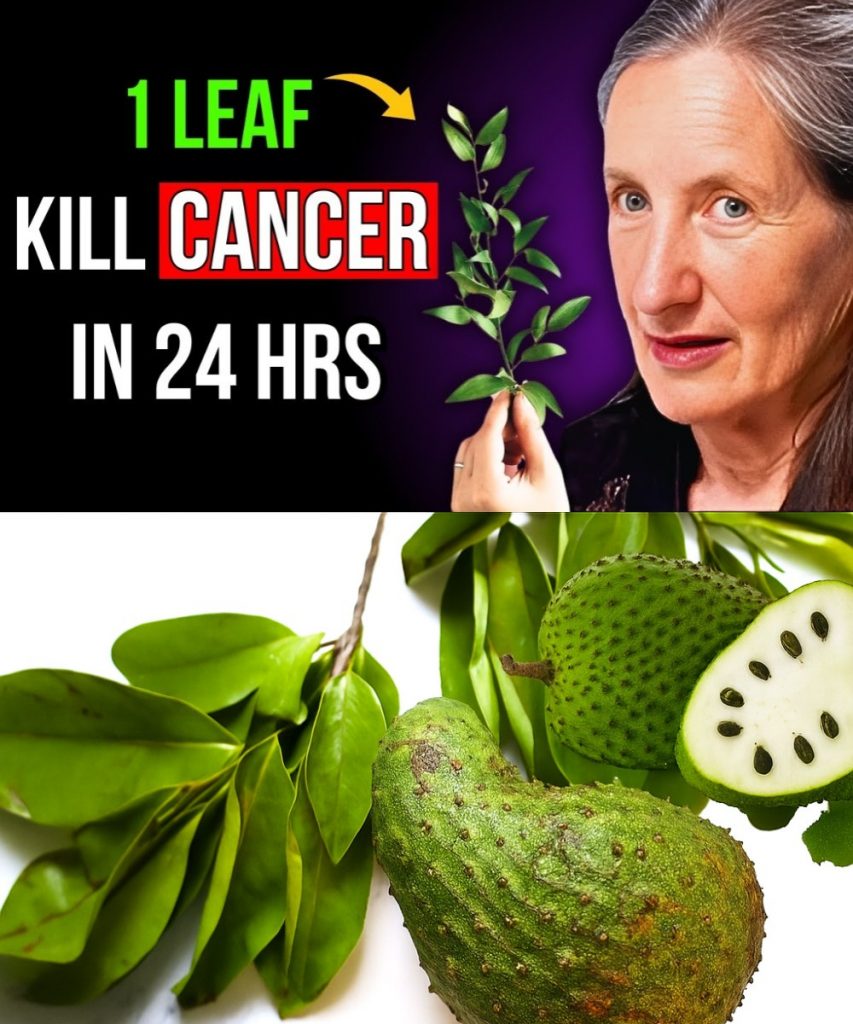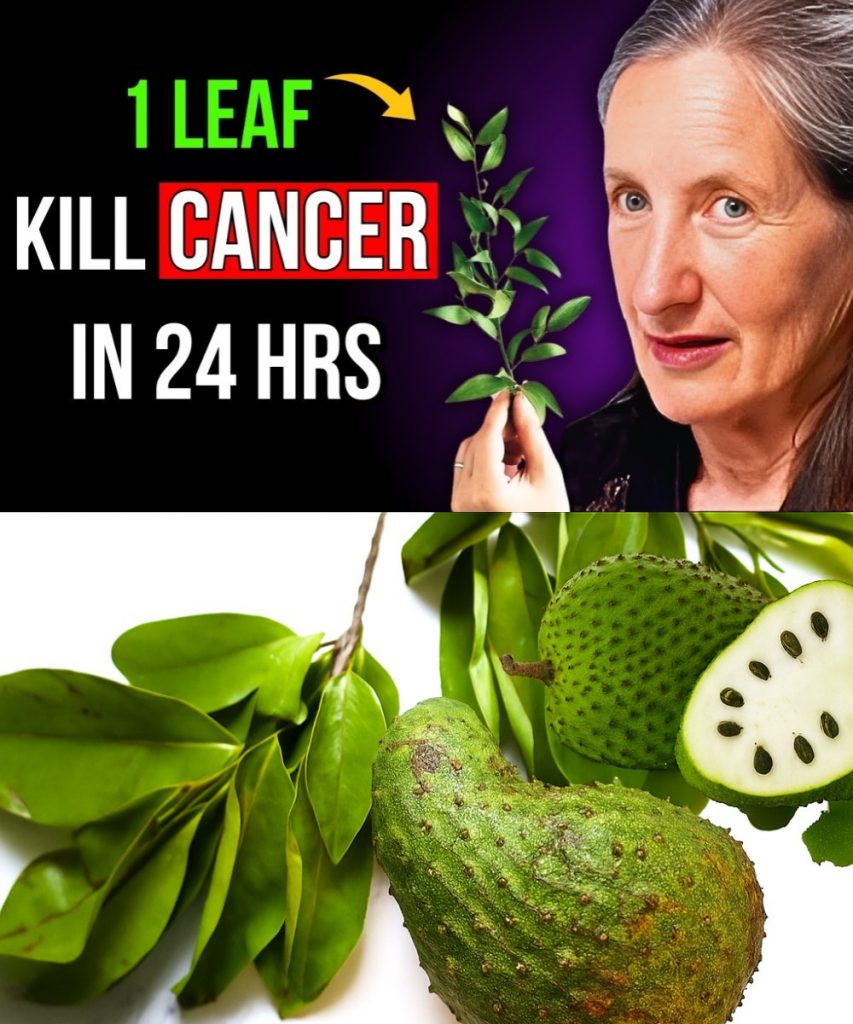What if a tropical plant growing in your backyard held the secret to fighting cancer? Graviola (Annona muricata), also known as soursop, has sparked intense curiosity with claims of its potent anti-cancer properties, championed by figures like Barbara O’Neill. This lush, green fruit tree, native to the rainforests of Africa, South America, and Southeast Asia, is celebrated in traditional medicine for its leaves, fruit, and bark. But can graviola leaf truly combat cancer, or is it just another wellness fad wrapped in hype?
Join us as we dive deep into the science, myths, and realities of graviola leaf, exploring 20 potential health benefits while addressing the controversial claims surrounding its use as a cancer remedy. Prepare to uncover the truth behind this intriguing plant and learn how to approach it safely.

🌱 What Is Graviola Leaf? Nature’s Tropical Treasure
Graviola is a small evergreen tree with heart-shaped, prickly fruit and glossy leaves, thriving in tropical climates. Its leaves, rich in phytochemicals like annonaceous acetogenins, have been used for centuries in folk remedies to treat ailments from fevers to infections. Traditional healers have brewed graviola leaf tea to soothe digestive issues, reduce inflammation, and even fight parasites.
But it’s the modern spotlight on graviola’s potential anti-cancer properties that has captured attention, particularly through advocates like Barbara O’Neill, who has promoted it as a natural alternative to conventional treatments. Yet, her claims have stirred controversy, with health authorities questioning their validity. Let’s explore the benefits of graviola leaf and separate fact from fiction.
💪 20 Potential Health Benefits of Graviola Leaf
🩺 Inhibits Cancer Cell Growth
Laboratory studies suggest graviola leaf extracts may target cancer cells, particularly in breast, prostate, colorectal, lung, and pancreatic cancers, by inducing programmed cell death (apoptosis). However, human studies are lacking, and claims of a “cure” remain unproven.
🛡️ Rich in Antioxidants
Graviola leaves are packed with antioxidants, which neutralize free radicals, potentially reducing oxidative stress linked to chronic diseases like cancer and heart disease.
🔥 Reduces Inflammation
The anti-inflammatory properties of graviola leaf may ease pain from arthritis, muscle soreness, and other inflammatory conditions when consumed as tea or applied topically.
🩹 Promotes Wound Healing
Crushed graviola leaves, applied as a poultice, can accelerate healing of minor cuts and bruises due to their antimicrobial and soothing properties.
🍽️ Supports Digestive Health
Graviola leaf tea may relieve indigestion, bloating, and diarrhea, acting as a gentle remedy for digestive discomfort.
🦠 Fights Bacterial Infections
The antimicrobial compounds in graviola leaves combat bacteria, making them useful for treating minor skin infections or preventing wound contamination.
🚰 Acts as a Natural Diuretic
Graviola leaf promotes urine production, helping flush toxins and support kidney health, which may reduce water retention.
🩺 Stabilizes Blood Sugar
Studies on animals show graviola leaf extracts may lower blood glucose levels, offering potential support for diabetes management, though human evidence is limited.
❤️ Improves Cardiovascular Health
By reducing blood pressure and cholesterol levels, graviola leaf may support heart health, thanks to its antioxidant and hypotensive effects.
🌬️ Eases Respiratory Issues
Graviola leaf tea may soothe coughs and asthma symptoms by relaxing bronchial passages, a traditional use in some cultures.
😌 Relieves Stress and Anxiety
The sedative properties of graviola leaf tea may calm the nervous system, helping to reduce stress and promote relaxation.
💆 Enhances Sleep Quality
Drinking graviola tea before bed may act as a natural sleep aid, counteracting stress hormones like cortisol for a restful night.
🦟 Combats Parasites
Traditional uses include graviola leaf to expel intestinal parasites, with some studies supporting its antiparasitic effects.
🩺 Protects Liver Health
Animal studies suggest graviola leaf may reduce oxidative stress in the liver, supporting detoxification and overall liver function.
🌿 Soothes Skin Conditions
Applied topically, graviola leaf paste may relieve eczema, acne, and rashes due to its anti-inflammatory and antibacterial properties.
🩺 Manages Hypertension
Graviola leaf’s hypotensive effects may help lower blood pressure, supporting cardiovascular wellness in traditional remedies.
💪 Reduces Pain
The analgesic properties of graviola leaf may alleviate pain from injuries or chronic conditions when used as a tea or poultice.
🛡️ Boosts Immune Function
Antioxidants and bioactive compounds in graviola leaves strengthen the immune system, helping fight off infections.
🩺 Supports Pancreatic Health
In lab studies, graviola leaf extracts have shown promise in protecting pancreatic beta-cells, potentially aiding glucose metabolism.
🌾 Prevents Tumor Progression
Some animal studies indicate graviola leaf may inhibit tumor growth and metastasis, though human trials are needed to confirm efficacy.
🌿 The Barbara O’Neill Controversy: Fact or Hype?
Barbara O’Neill, a prominent alternative health advocate, has championed graviola leaf as a cancer-fighting remedy, often suggesting it as an alternative to chemotherapy. Her claims, including assertions that cancer is a fungus treatable with baking soda or that graviola is “10,000 times more effective than chemotherapy,” have drawn significant scrutiny. In 2019, the New South Wales Health Care Complaints Commission banned O’Neill from providing health services, citing her lack of recognized qualifications and dangerous advice, such as urging cancer patients to forgo conventional treatments.
While O’Neill’s passion for natural remedies resonates with those seeking alternatives, her claims about graviola lack robust scientific backing. Laboratory studies show promise, with graviola’s acetogenins targeting cancer cells in test tubes and animal models. However, no human clinical trials confirm these effects, and reputable cancer organizations, like the American Cancer Society, caution against relying on graviola as a primary treatment. The absence of standardized dosing and potential risks further complicate its use.
O’Neill’s narrative taps into a deep desire for natural solutions, but it’s critical to approach her claims with skepticism. Misleading assertions, amplified by social media and AI-generated content, have fueled misinformation, making it essential to prioritize evidence-based guidance.
🌱 How to Use Graviola Leaf Safely
Ready to explore Kalanchoe pinnata’s potential? Here are safe and effective ways to incorporate it into your routine:
☕ As a Tea
Boil 1-2 fresh or dried graviola leaves in 1 cup of water for 5-10 minutes. Strain and drink 1-2 cups daily to support digestion, immunity, or relaxation. Avoid excessive intake to prevent side effects.
🩹 Topical Application
Crush fresh leaves into a paste and apply to wounds, rashes, or inflamed joints. Cover with a bandage and leave for a few hours to promote healing.
🧴 As a Compress
Soak a clean cloth in a warm graviola leaf decoction and apply to swollen or painful areas for soothing relief. Ensure dilution to avoid irritation.
🛢️ As an Infused Oil
Soak crushed leaves in a carrier oil, like olive oil, for 2-3 weeks. Use the oil to treat skin conditions or relieve pain.
⚠️ Safety Precautions and Risks
Graviola leaf is promising but not without risks. Here are key precautions to ensure safe use:
- Moderation is Crucial: Excessive consumption may cause nausea, vomiting, or neurological issues. Stick to recommended doses (1-2 cups of tea daily).
- Neurotoxicity Concerns: Studies suggest graviola’s acetogenins may be linked to nerve changes resembling Parkinson’s disease in some populations. Use cautiously.
- Avoid During Pregnancy: The herb’s effects on pregnancy are unknown, so consult a healthcare provider before use.
- Drug Interactions: Graviola may interact with medications for diabetes, hypertension, or chemotherapy. Consult a doctor if you’re on medication.
- Test for Skin Sensitivity: The leaf’s sap may cause irritation. Test a small amount on your skin before widespread use.
- Consult a Professional: Always seek guidance from a healthcare provider, especially for serious conditions like cancer.
Disclaimer: This article is for informational purposes only and does not replace professional medical advice. Consult a qualified healthcare provider before using graviola leaf, especially for cancer or other serious conditions.

🌱 Why Graviola Leaf Deserves Your Attention
Graviola is more than a tropical curiosity—it’s a plant with a rich legacy in traditional medicine and promising potential in modern research. Its antioxidant, anti-inflammatory, and antimicrobial properties make it a versatile ally for wellness, from soothing digestive issues to supporting immunity. However, the hype surrounding its cancer-fighting claims, particularly from figures like Barbara O’Neill, must be tempered with caution. While lab studies are encouraging, the lack of human trials and potential risks demand a balanced approach.
By exploring graviola leaf, you’re tapping into centuries of herbal wisdom, but science must guide its use. Whether you’re sipping its tea to ease stress or applying a poultice to heal a wound, this plant offers a glimpse into nature’s vast pharmacy.
🌿 Final Thoughts: Separating Fact from Hype
The next time you hear about graviola leaf as a “miracle cure,” pause and reflect. This remarkable plant holds undeniable potential, but it’s not a substitute for proven medical treatments. Its benefits, from antioxidant power to digestive support, are compelling, but claims of curing cancer remain unproven and risky without professional oversight.
Let Graviola inspire you to explore nature’s healing gifts, but always prioritize evidence and safety. With proper use and guidance, this tropical treasure can enhance your wellness journey without falling into the trap of hype. Embrace the truth behind graviola leaf and let it guide you toward informed, natural health choices.









